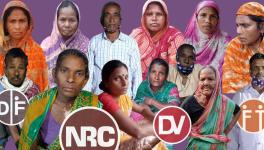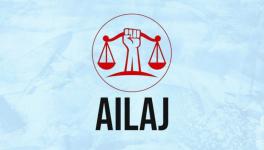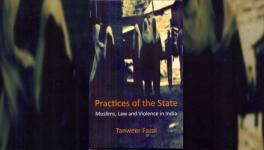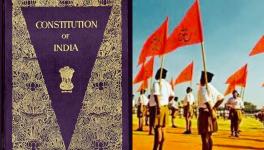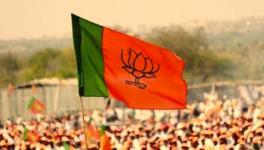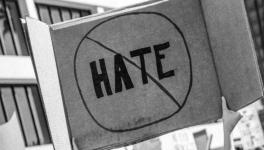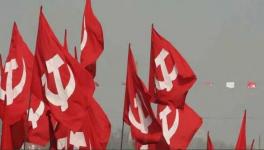Stop NPR to Bring Back Peace in Delhi and Beyond
Delhi is a powder keg right now. Violence has consumed at least 10 people and injured dozens. There are reports of large-scale arson and vandalism from North-East Delhi, where protests had been taking place peacefully against the Citizenship Amendment Act (CAA) for several weeks. Suddenly, on the night of February 24, reports of a complete breakdown of law and order started coming in. In many affected areas, the police was invisible or ineffective, and goons had a field day.
This is the first large-scale riot in the national capital after long years. A bloodbath was witnessed last in 1984 anti-Sikh riots. The people of Delhi had completely forgotten the ghost of riots and bloodletting. On Monday, just a day after BJP leader Kapil Mishra hit the streets of Jaffrabad and Maujpur, all that changed. There was stone-pelting on Sunday, too, but it is after Mishra threatened the peaceful anti-CAA protesters that things quickly went out of control.
Yes, the situation is dire, but it is also a fact that opposition to the CAA and National Population Register (NPR) has gained momentum across the country.
As the situation in Jaffrabad spiralled out of control, I asked Raihan, a volunteer at the Jaffrabad Metro Station anti-CAA protest site, why people had been protesting there. He said that the locals feared for their existence and were protesting out of desperation. There has been widespread panic in the locality over its implications. “They want,” he tells me, “the government to stop the NPR exercise and withdraw or amend the CAA to include Muslims.” The NPR, he said, is effectively the NRC, just under a different name.
The BJP-led National Democratic Alliance government has announced the schedule for the nationwide NPR, which is due to commence on April 1. Eight new questions have been added to the old NPR 2010 questionnaire, which has added to the discomfiture of not just the Muslims but many others.
Many Opposition leaders, besides human rights activists, have been saying that the NPR will be a stepping stone towards the National Register of Citizens (NRC) that the government can use to declare certain people ‘doubtful’ citizens. This message has now sunk in among the protesters and a large section of the general public is also slowly becoming aware of the nuances of this issue. They are, for instance, realising that this law shifts the onus of proving citizenship on people, an especially tough task for those who end up being declared ‘doubtful’ as part of its processes.
For this reason, the anti-CAA protesters have recently been heard asking the government to assure them that the nationwide NRC will not be rolled out and that the new questions in the NPR are also dropped. The place and date of birth of parents, passport details, PAN cards, voter IDs, Aadhaar cards, etc—which the government plans to seek as part of this exercise—has pushed the community to the point of paranoia after the experiences in Assam. Of the 19 lakh people who did not find their names on the NRC list in the Eastern state, at least a third are Muslims.
Many ministers, including Home Minister Amit Shah, have said that Hindus excluded from the Assam NRC would be granted citizenship through the backdoor of CAA. Therefore, the Muslims fear that they could be denied citizenship and left with no recourse. This is the reason why at least 150 round-the-clock sit-ins have come up across the country, at which people are claiming “kagaz nahi dikhayenge—we will not show our papers” to the NPR enumerators.
Mujtaba Farooq, co-convener of the Alliance against CAA, says there is “no confusion” on opposing NPR. “We are unanimous that it needs to be opposed and should not be implemented,” he says. He also says that there are several lacunae in the NPR which offer a wide scope for legal intervention against it. “Several people have already approached the court against the nationwide rollout. If the court stays the process, it will be best and the community will have to do nothing on the issue.” He says, without sharing further details, that more cases against the proposed rollout of the NPR are expected to be filed in coming days.
The situation is the same in many parts of the country. In Madhya Pradesh ‘Kagaz nahi dikhayenge’ posters are popping up in many localities of Bhopal, the capital, and elsewhere. Congress legislator Arif Masood is leading a campaign to put up messages and stickers on doorways telling NPR enumerators that they are not welcome and should go back. He is holding campaigns in neighbourhoods where Muslim, dalit and backward-caste members are well-represented.
“The campaign started from the constituency I represent [Bhopal central]and will take place everywhere in the state,” Masood told news agency PTI. He has also said that he will quit the state Congress government if the NPR process is allowed to go on.
Similar campaigns are underway in other regions. Syed Khalid, a Hyderabad based techie, who has launched the Defeat NRC App, has started a campaign to boycott NPR. He told me that if the government does not abort the campaign, people should not show their papers to NPR enumerators, which would make the exercise a complete failure. He says, “Once NPR is in place, the government will be armed with people’s passport numbers, dates and places of birth of their parents, and all other details. There is no denying that NPR is NRC.”
But does Khalid think campaigns like his can succeed? “This is a Hobson’s Choice for the people. If the government completes NPR, it can put a ‘doubtful’ mark on any name and ask them to prove their citizenship.” Hence Khalid has been trying to get mosques to spread awareness of the boycott campaigns. “If people do not cooperate with the NPR enumerators the entire project will fall flat,” he says.
Farooq’s platform is also trying to convince political parties in Opposition-ruled states to not implement the NPR. “If Opposition chief ministers agree to our proposition, there will be no need to boycott it. Only BJP-ruled states will have NPR then. It will no longer be a national exercise,” he says. He is aware that the NPR is a central subject and does not fall under state jurisdiction. Yet, he feels, non-cooperation by Opposition-ruled states would make the exercise meaningless.
The issue is that in many parts of the country, such as the most-populated state, Uttar Pradesh, there is a reign of fear following the brutal crackdown against anti-CAA protesters. Where 22 protesters died, mostly in police firing, a boycott can seem like romanticism, says Farhan Khan, a UP-based activist. She tells me that ‘kagaz nahi dikhayenge’ is a slogan of the “polished elite class” only. “There is complete chaos among the Muslims and the police crackdown against the protesters is still on,” she says.
Nikhat, from Delhi, who teaches in a college in Kerala, tells me, “If someone refuses to participate individually or as a family unit, they risk being categorised as doubtful voters. Therefore, a boycott has to be a collective decision—but how do we reach a consensus? And what happens to those living away from their native place?”
These doubts are what activists and volunteers are now trying to address. Khalid, who became known after he launched the ‘Missing Voters’ App, believes that campaigns against NPR are actually gaining currency fast. A large number of people have put up anti-NPR posters outside their colonies and housing societies, and they are asking enumerators to come only if the new questions are dropped, he says. Khalid also proposes using mosques to create awareness on the boycott. “Many mosque committees have agreed to join already,” he says.
There are ongoing efforts to bring all organisations opposed to NPR-NRC-CAA on a single platform and devise a combined boycott strategy for the country. “If the court rules against NPR, there will be no need for a boycott. If Opposition-ruled states don’t cooperate with the exercise, the boycott campaign will only be needed in BJP-ruled states. But even if we have to boycott it at the national level, we are prepared,” says Farooq.
Recently, former Uttar Pradesh chief minister Akhilesh Yadav said his Samajwadi Party’s cadre would boycott NPR by refusing to fill the form. “Members of Samajwadi Party will not fill NPR forms... Instead of NPR and NRC, the government should go for caste census to ascertain the share of each caste in the total population. That is the lasting solution to the social conflict based on caste and religion,” he said.
Kerala, Madhya Pradesh, Chhattisgarh, Punjab and West Bengal are saying they will not implement NPR. Others are sure to join them. It is all but certain that NPR will not be a smooth process: a nationwide NPR, at least at the moment, seems a distant dream.
The author is a writer and columnist. The views are personal.
Get the latest reports & analysis with people's perspective on Protests, movements & deep analytical videos, discussions of the current affairs in your Telegram app. Subscribe to NewsClick's Telegram channel & get Real-Time updates on stories, as they get published on our website.









